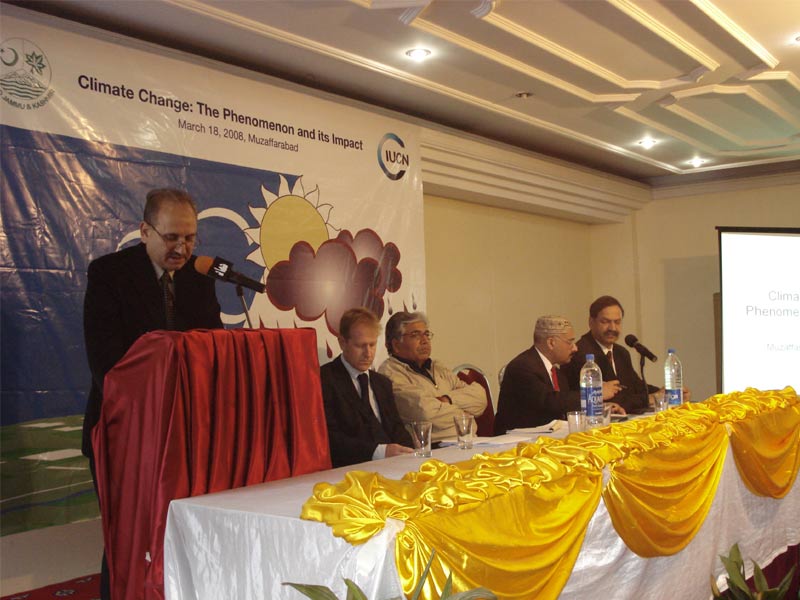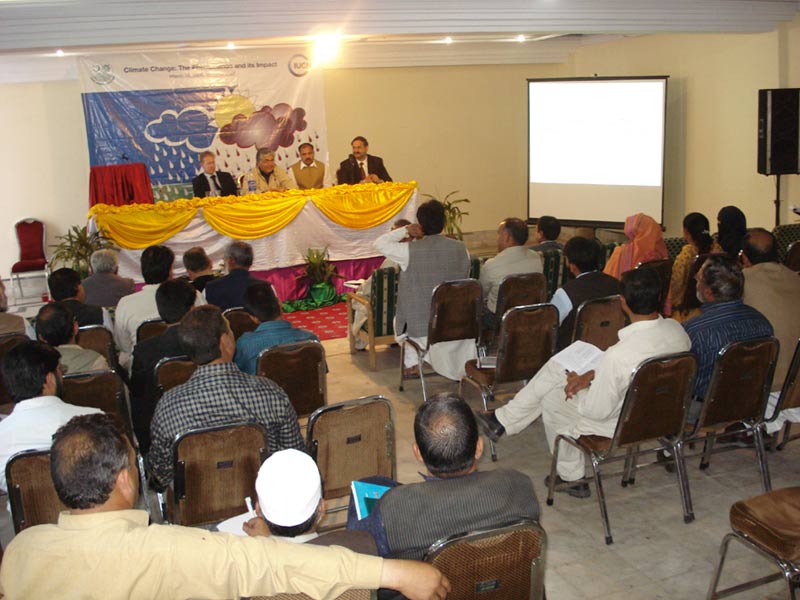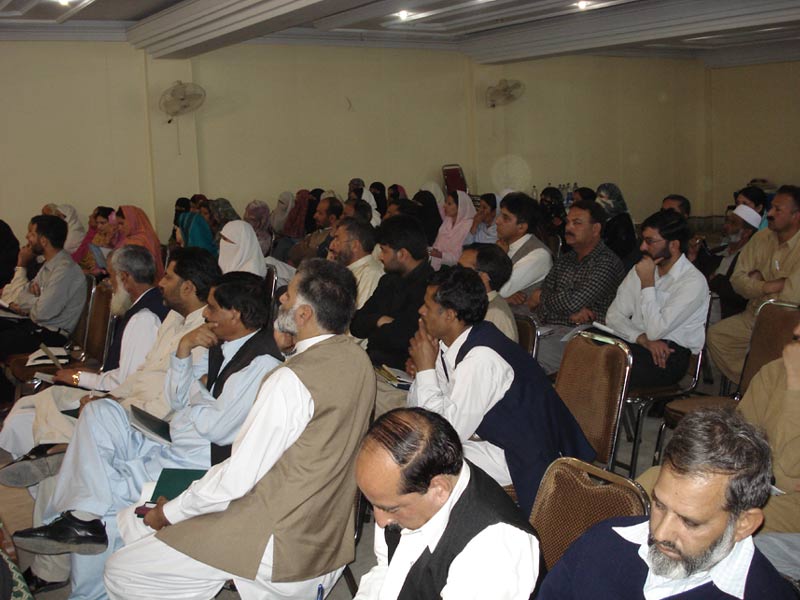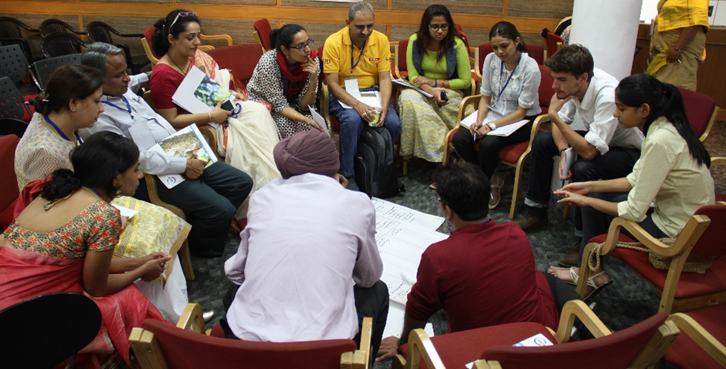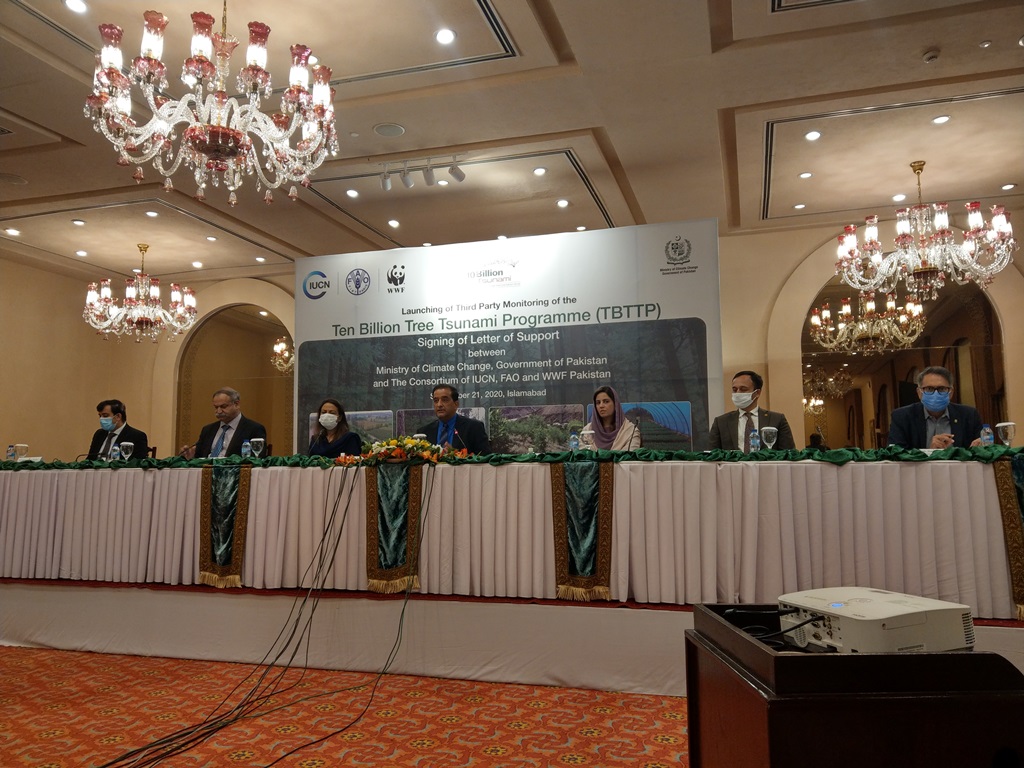Climate change phenomenon is a reality – poses serious water and food security threats
Inclusive policies and an urgent action plan required to minimize the threats
Muzaffarabad, Azad Jammu Kashmir, 18 March, 2008 (IUCN) – A Seminar titled Climate Change: The Phenomenon and its Impacts was held on March 18, 2008 at the Neelum View Hotel, Muzaffarabad. Jointly organized by the Environmental Protection Agency (EPA), Azad Jammu and Kashmir (AJK) and IUCN (International Union for Conservation of Nature) Pakistan’s AJK Programme, the purpose of the Seminar was to raise awareness about the issue with a special focus on AJK. The initiative has been funded by the Royal Norwegian Embassy and the United Kingdom’s Department for International Development (DFID).
The Seminar was attended by a large number of stakeholders, including AJK government officials, researchers, representatives of civil society organizations, media, academia and university students.
Welcoming the participants Muhammad Bashir Khan, Director, Environmental Protection Agency, AJK stated that the seminar has been organized to raise awareness on climate change issues in the global and local contexts. He was of the opinion that the event would initiate the process of formulating strategies to combat climate change and drawing up practical action plans. He urged upon academicians and the media to convey the critical importance of addressing climate change to the new generation. He also stressed the crucial need for the integration of environmental costs into economic development policies and plans. He further requested IUCN to support the Government of AJK in development of the AJK’s Sustainable Development Strategy and technical demonstration project for land stabilization to prevent landslides in natural disasters prone areas. Both these initiatives are considered to be extremely important for AJK in the context of the 2005 earthquake.
Chaudhry Muhammad Akbar Ibrahim, Minister for Tourism, Wildlife & Environment, AJK opined that climate change was no longer a debatable phenomenon, and its impacts were already being felt in AJK. He stressed the need to strengthen environmental protection and management in AJK to effectively respond to the challenges posed by climate change. The minister informed the participants about various initiatives being taken by the AJK government, including the allocation of over Rs. 300 million during 2007 – 08 for local Annual Development Plan (ADP) projects in the sectors of forestry, watershed management, wildlife and fisheries. He also mentioned that federally sponsored projects under the PSDP have also been initiated in the areas of poverty reduction and forestry development.
Secretary Forests, AJK, Sardar Mohammad Rahim Khan called for attention to the impact of climatic change in AJK and for urgent need to start adaptation measures. He informed that the Government of AJK had initiated joint activities with IUCN’s AJK Programme to address environmental challenges in the region.
Andrew McCoubrey, Infrastructure and Development Advisor, DFID, U.K. emphasized that climate change is globally recognized as a major threat to prosperity and poverty alleviation. He informed that the United Kingdom had recently passed a climate change bill that aimed to reduce UK’s carbon emissions by 60 percent by 2050.
Addressing the participants, Mahmood Akhtar Cheema, Head AJK Programme, IUCN Pakistan emphasized the need of bringing together all stakeholders for furthering the climate change agenda in Pakistan. He stressed the importance of conducting scientific research on climate change applicable to the development of policies in various socio-economic sectors through preparation of summary briefs for policy makers. These would help in ensuring that climate change concerns are integrated in all government policies and plans, enabling the government to address the problem in a comprehensive manner. Mr. Cheema also introduced the audience about the Technical Advisory Panel on Climate Change that had been setup under the Ministry of Environment with its Secretariat hosted by IUCN. Cheema reiterated IUCN’s commitment to supporting the Government of Pakistan in responding to climate change concerns in the country.
Presentations on various aspects of climate change were made by experts from various organizations. Safia Shafiq from IUCN Pakistan presented an overview of the phenomenon of climate change and its likely impact at the global and national levels. Ghazanfar Ali, Head Water Section, Global Change Impact Studies Center (GCISC) presented his research on the impact of climate change on the water resources in Pakistan. Basing his arguments on the premise that Pakistan is already on the borderline of becoming a water-poor nation and this situation is bound to be further exacerbated by the impending climatic changes. Dr. Pervaiz Amir, an eminent expert on agriculture expanded upon the impacts of climate change on the agriculture sector of Pakistan, with particular focus on AJK. He stressed the need for developing adaptation strategies and developing linkages at the international level for support in addressing climate change in Azad Jammu and Kashmir.
For more information, please contact:
Shahzad Ahmad
Programme Officer - IUCN Islamabad Office
9, St. 64, F- 8/4
Islamabad, Pakistan
tel: + 92 51 2850250
email: shahzad.ahmad@isb.iucnp.org
About IUCN (International Union for Conservation of Nature)Created in 1948, IUCN brings together 83 States, 111 government agencies, 800 plus NGOs, and some 10,000 scientists and experts from 148 countries in a unique worldwide partnership. The Union’s mission is to influence, encourage and assist societies throughout the world to conserve the integrity and diversity of nature and to ensure that any use of natural resources is equitable and ecologically sustainable.The Union is the world’s largest environmental knowledge network and has helped over 75 countries to prepare and implement national conservation and biodiversity strategies. The Union is a multicultural, multilingual organization with 1,000 staff located in 62 countries. Its headquarters are in Gland, Switzerland.IUCN Pakistan has programmes from the north to the south of the country and multiple field projects. It is one of the nine Country Offices of IUCN’s Asia Programme, covering 23 countries with a workforce of nearly 500.More information can be found at https://www.iucn.org/
